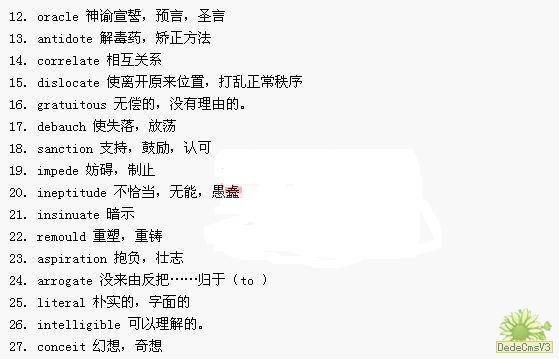
难句译注
1. Yet the difference in tome and language must strike us, so soon as it is philosophy that speaks: that change should remind us that even if the function of religion and that of reason coincide, this function is performed in the two cases by very different organs.
[参考译文] 可是音调和语言的差异必然很快的给我们深刻的印象,就象哲学所说的那样:那种差异应提乡我们,即使宗教的功能和理性的功能恰好相符的话,其功能也是通过不同的器官在两种不同的情况下完成的。
2. Reason, on the other hand, is a mere1 principle or potential order, on which indeed we may come to reflect but which exists in us ideally only, without variation or stress of any kind.
[参考译文] 另一方面,理性知识一种原则或者是潜在的秩序,我们确实可以在此基础上存在于我们心中,没有种种变化,或任何压力。
3. We conform or do not conform to it; it does not urge or chide2 us, not call for any emotions on our part other than those naturally aroused by the various objects which it unfolds in their true nature and proportion.
[参考译文] 不论我们是否遵循理性,它不会极力或责备我们,除了以事物的本来面目和比例揭示各种事物而自然而然的激起我们的感情,它并不需要我们付出任何感情。
4. Religion, in its intent, is a more conscious and direct pursuit of the Life of Reason than is society, science, or art, for these approach and fill out the ideal life tentatively and piecemeal3, hardly regarding the foal or caring for the ultimate justification4 of the instinctive5 aims.
[参考译文] 宗教在其意义上,比社会,科学,艺术更自觉,更直接的追求“理性生活”,因为这些东西(社会,科学,艺术)暂时而又零星的接近和填补理想的生活,无视目的,也不管其本能的目标是否最终证明正确。
5. one and all 各个都,全部
6. Those within the pale of each religion may prevail upon themselves, to express satisfaction with its results, thanks to a fond partiality in reading the past and generous draughts6 of hope for the future; but any one regarding the various religions at once and comparing their achievements with what reason requires, must feel how terrible is the disappointment which they have one and all prepared for mankind.
[参考译文] 处于宗教领域范围之内的人民也许会说服自己对其结果表示满意,这要感谢他们在结实过去和对未来希望宽宏要切上的一种偏爱。可是任何迅速关注宗教的人,把其成就和理性所要求的一切做一比较,必然感到这种种宗教为全人类作好的失望是实在太可怕了。
7. To confuse intelligence and dislocate sentiment by gratuitous7 fictions is a short-sighted way of pursuing happiness.
[参考译文] 以无理的幻想混淆智力,弄乱正常的情感是一种短视的追求幸福的方法。
8. Thus religion too often debauches the morality it comes to sanction and impedes8 the science it ought to fulfill9.
[参考译文] 因此,宗教常常会使它要支持的道德堕落沦丧,并妨碍它应该执行的科学任务。
9. The condition and the aims of life are both represented in religion poetically10, but this poetry tends to arrogate11 to itself literal truth and moral authority, neither of which it possesses.
[参考译文] 生活的目标和条件在宗教中诗一般的呈现,但这种诗意往往把宗教所并不具有的朴实真理和道德威力没有来由的归于宗教。
写作方法与文章大意
这是一篇用对比手法写出宗教和理性之差异并着重描述宗教的文章。有各种中焦,理性只有一个,纵然两者在功能和目的上有不相同之处,但由于宗教以直觉,想象力,情感为主,无视目的,虽比科学,社会或艺术更自觉,更直接追求理性生活,结果却是失败和失望,而理性则相反。
答案祥解
1. C. 一种有目的而2. 又不3. 带偏见对最佳事物的探索。答案在最后一段,4. 这种愚蠢的秘密是什么?为什么宗教在目的上那么接近真理,5. 在其结构和结果上,6. 却没有理性的一切7. ?答案很简单:宗教是通过想象来追逐理性,8. 当它解释事件或阐明原因时,9. 以虚构的想象来取代科学,10. 当它训诫,11. 暗示理想或者重塑抱负时,12. 以想象代替智慧——智慧的意思是指13. 有意识而14. 又公正的追求一切15. 好东西。
A. 通过想象力追求理性。 B. 不带感情的探询真理。 C. 追求幸福的短视的方法。
16. A. 宗教通过想象力寻求真理,而17. 理性的探索却运用感情。见难句译注3,18. 理性(智)是非感情的。
B. 在解决人类问题上的宗教是一种无效的工具。 C. 科学寻求逐步解决对人类的问题。 D. 哲学和理性的功能是一样的。
19. A. 宗教没有意识(不20. 知道)其最终目的的。见难句译注4,21. 说明宗教不22. 管(几乎不23. 关注)其目的,24. 或不25. 关心其本能的目标26. 最终真确与否。
B. 宗教没有想象力。 C. 其成果是确切的,最终的。 D. 宗教很象科学和艺术。
27. D. 它激起人类情感。第一段中说“宗教的挣扎与不28. 断变化的力量似乎促使人追求某种永恒的东西,29. 它似乎追求灵魂的最终和谐以及灵魂与灵魂所依赖的一起事物之间的永恒的和谐。”
A. 宗教依赖于直觉而不是推理。第一段最后一句:宗教也有本能和盲目的一面,在各种各样的偶然实践和直觉中沸腾。可不久它又向事物内心摸索前进,然而不论从哪个方向来,都转想最终方向(最终多转想这个方向——直觉),文章的最后一句:宗教的目的和理想的目的一样,而其实现目的方法是通过直觉和无限止的诗一般的幻想来进行的。 B. 它不关心其本能的目标最终是否真确。 C. 它使人类很失望。
30. D. 无效。第二段开始就点出:我们得承认宗教追求理性生活一直是很失败(流产了)。
A. 有想象力的。 B. 为未来提供希望的。 C. 是一个高度的智力活动。